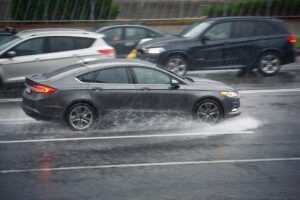
While the non-deployment of airbags can be concerning and potentially dangerous, it alone may not guarantee a successful legal claim. To build a case, you must establish that the airbag failure resulted from someone’s negligence. For example, the manufacturer can be liable for distributing defective airbags.
At SKG, we are dedicated to helping injured Florida victims. Our Florida car accident lawyers will investigate why airbags were not deployed during a collision. We will review your options to take legal action and recover compensation. Call us today for a free case review.
Understanding Airbag Functionality and Deployment
When a collision occurs, sensors within the vehicle detect the impact and send signals to the airbag control module. This module then triggers the deployment of the airbags, which inflate rapidly to provide a cushioning effect and prevent occupants from striking hard surfaces.
It is important to understand that airbags are not meant to deploy in every car accident. They are designed to activate in moderate to severe crashes, typically those with a significant frontal impact. Factors such as the speed of the collision, the angle of impact, and the location of the sensors all play a role in determining whether the airbags will deploy.
It’s also worth noting that some newer vehicles are equipped with advanced sensors that can detect other types of crashes, such as side impacts or rollovers, which may also lead to airbag deployment.
More people choose The Schiller Kessler Group because they know that we're a cut above other personal injury law firms.

Factors That May Prevent Airbag Deployment
Several factors could prevent the deployment of airbags in a car accident. It is crucial to understand these factors as they can greatly impact your case if your airbags don’t deploy during a crash.
Factors that can prevent airbag deployment include:
- Sensor malfunction: If the sensors responsible for detecting a collision fail to function properly, they may not trigger the airbag deployment.
- Impact angle: The collision’s angle can affect the airbag deployment.
- Speed of the collision: Airbags are designed to deploy at certain speeds. If the collision is below the threshold, the airbags may not activate.
- Rear-end collisions: Airbags are primarily designed for front-end collisions. In rear-end or side-impact collisions, airbags may not deploy or deploy with less force, depending on the vehicle’s design.
- Age and condition of the vehicle: Older vehicles may have outdated airbag systems that are less reliable, and the overall condition of the vehicle, including the wiring and sensors, can affect airbag deployment.
- Maintenance and repair history: Neglecting regular maintenance or improper repairs to the airbag system can lead to malfunctions and prevent proper deployment.
These factors help determine whether your airbags should have been deployed during the car crash. Understanding them can help you assess the viability of your case.
Evaluating the Impact of Airbag Non-Deployment on Injury Claims
When our Florida personal injury lawyers handle a car accident claim, one of the factors we carefully consider is whether the airbags are deployed or not.
If the airbags did not deploy during the crash, it could significantly impact the severity of the injuries you sustained. Non-deployment of airbags can lead to more severe injuries, as you are not protected from the force of the impact.
This can strengthen the case, as it shows that the injuries could have been prevented or minimized if the airbags had functioned properly. We investigate the reasons behind the non-deployment, such as faulty sensors or maintenance issues, to build a strong case and seek fair compensation.
Assessing Liability in Cases of Airbag Failure
When assessing liability in cases of airbag failure, carefully evaluate the circumstances surrounding the non-deployment. As legal professionals, we understand the complexities involved in determining who should be held accountable for the airbag’s failure to deploy during a car accident.
To help you grasp the legal implications behind this assessment, consider the following:
- The condition of the airbag system
- The impact severity
- The type of impact
- The severity of your injuries
- Manufacturer’s responsibility
By examining these factors, we can unravel the complexities of your case and determine the potential liability of the parties involved. Rest assured, our legal professionals will build a strong case on your behalf.
Seeking Legal Recourse for Airbag Non-Deployment in Car Accidents
It’s crucial to seek legal recourse if your airbags fail to deploy in a car accident. When your airbags don’t work properly during a collision, it can lead to serious injuries or even death. As victims, you can hold the responsible parties accountable for their negligence.
By taking legal action, you can seek compensation for medical expenses, lost wages, pain and suffering, and any other damages resulting from the airbag failure. Consult an experienced personal injury attorney to evaluate the circumstances surrounding the accident, gather evidence, and build a strong case on our behalf.
A Car Accident Attorney Will Strengthen Your Claim
If your airbags didn’t deploy during a car accident, you may have a case for seeking compensation. Understanding the functionality and deployment of airbags and the factors that may prevent their deployment is crucial in evaluating the impact on your claim.
A car accident lawyer from SKG will assess liability in cases of airbag failure to determine if you have a viable case. Contact our law firm today to explore your options and pursue justice for injuries sustained.
Injured? Call The Aggressive Attorneys Today





